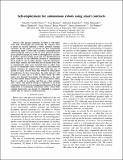Self-employment for autonomous robots using smart contracts
Author(s)
Castelló Ferrer, Eduardo; Berman, Ivan; Kapitonov, Aleksandr; Manaenko, Vadim; Chernyaev, Makar; Tarasov, Pavel; Wilson, Bryan; Greenwood, Dazza; Walters, Ed; ... Show more Show less
DownloadMain article (4.232Mb)
Terms of use
Metadata
Show full item recordAbstract
The physical autonomy of robots is well understood both theoretically and practically. By contrast, there is almost no research exploring a robot's potential economic autonomy. In this paper, we present the first economically autonomous robot---a robot able to produce marketable goods while having full control over the use of its generated income. In our proof-of-concept, the robot is self-employed as an artist. It produces physical artistic goods and uses blockchain-based smart contracts on the Ethereum network to autonomously list its goods for sale in online auctions. Using the blockchain-based smart contract, the robot then uses its income from sales to autonomously order more materials from an online shop, pay for its consumables such as network fees, and remunerate human assistance for support tasks. The robot also uses its income to repay investor loans that funded its initial phase of production. In these transactions, the robot interacts with humans as a peer, not as a tool. In other words, the robot makes peer financial transactions with humans in the same way that another human would, first as an investment vehicle, then as a seller at an auction, and then as a shop customer and a client. Our proof-of-concept is conducted as an in-lab experiment, but gives rise to an important discussion of the legal implications of economically autonomous robots, which under existing frameworks can already be embedded in corporate entities that are classed as artificial persons.
Date issued
2022-10-01Department
Massachusetts Institute of Technology. Media LaboratoryKeywords
Robotics, Blockchain, Financial Autonomy, Smart Contracts, Economic Autonomy
The following license files are associated with this item: